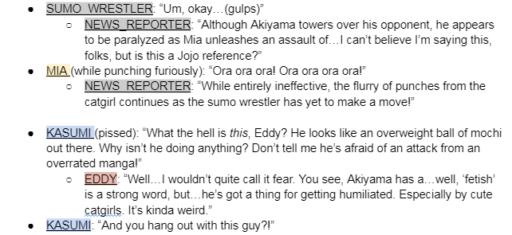If you’ve read my previous blog post on beat sheets, then you already know that I hold screenwriters in very high regard. When your scenes cost thousands of dollars and hundreds of working hours to make, you’re forced to refine your writing to a level no choicegame author comes anywhere close to.
While my new audio drama, Cops & Catgirls, may not be quite as expensive (or labor intensive) as a Netflix original series, it has forced me to write in a new format with restrictions I’ve never had to deal with before. And I’ve learned a ton in the process!
[Book 5 Update: The fifth entry of the Samurai of Hyuga series is releasing on September 1st! For the latest updates, make sure to follow me on twitter @MChoiceStudios!]
An Audio-Only Medium
To make matters trickier, an audio drama like Cops & Catgirls doesn’t have visuals to help describe what’s going on. This changes everything: dialogue must be adjusted so that characters explain what’s happening in a natural-sounding way.

Unlike with television, radio show characters often need to name the one they’re speaking to in order to prevent confusion. The listener should always know who is in the room and who isn’t!
Anime As Heck!
In my experience, audio dramas are secretly a very visual medium: it’s just that the visuals all happen inside our heads. I’m talking about imagination, of course, and it’s the job of both the scriptwriter and the voice actors to bring forth animated images into the minds of listeners.
Anime is a weird and wonderful medium with thousands of tropes and millions of fans across the globe. There is so much to pull from, from a particular type of evil laughter to tsundere personality types, all of which the audience is already familiar with. This familiarity makes ‘drawing an anime inside their heads’ that much easier.
But the most important factor—by far—in helping them visualize the story is…
Voices
Just like in real life, how words are spoken is often much more important than what the words actually are. Voices are the edge that audio dramas have over their written counterparts. It is said that pictures are worth a thousand words, but when it comes to how much emotion and personality is found inside human speech, I’d say a voice is worth at least twice as much!
The voice actors are—unsurprisingly enough—the stars of the show! They’re the ones with the power to bring it to life; as the scriptwriter, my job is to help point them in the right direction. Aside from giving cues for individual lines, things like italicizing words for emphasis and pauses in the right places are crucial.
But my directions are not the end-all be-all. Creativity needs space to breathe, and it’s not uncommon for a VA to take a line in a different (and far better) direction than I ever intended. That’s the power of a collaborative project!
Actions Are Harder Than Words
Writing action scenes suck: the descriptions required to explain what’s going on slow down the pace and dampen the excitement. It doesn’t matter what silly antics your protagonist is up to if you have to spend a couple paragraphs explaining it.
There are clever ways around this dilemma that keeps things tight and energy high, like integrating explanations into your dialogue. The most clear and obvious example of this is having an announcer giving listeners the play-by-play. But there are more subtle ways to have your characters narrate for you.

Word Count Matters
Unlike choicegames, where word count bloat is actually an advertising strategy, keeping a low word count in an audio drama is important. From a practical standpoint, more words = more money spent on voice acting, but it also takes more time. Considering all the pauses between speakers, listening takes at least twice as long as reading.
It’s something to be aware of, especially when listeners have less time (and attention) than ever before!
Working With Others
It’s weird writing dialogue that another person isn’t going to just read, but recite in a convincing manner. While I’ve worked with plenty of artists for covers and character portraits, and editors to varying degrees across several projects, I’ve never had experience working with voice actors before.
Nobody is a mind-reader, and so communication is especially important. Everyone has their own vision and interpretation—even the same sentence could be approached a dozen different ways! As a scriptwriter, you have to be aware of this.
And while it’s not always smooth sailing, I can say this much: there are few things more creatively satisfying than hearing the voice in your head breathed into life. Anyone who helps turn my silly ideas into reality…well, they’re OK in my book!


Recent Comments